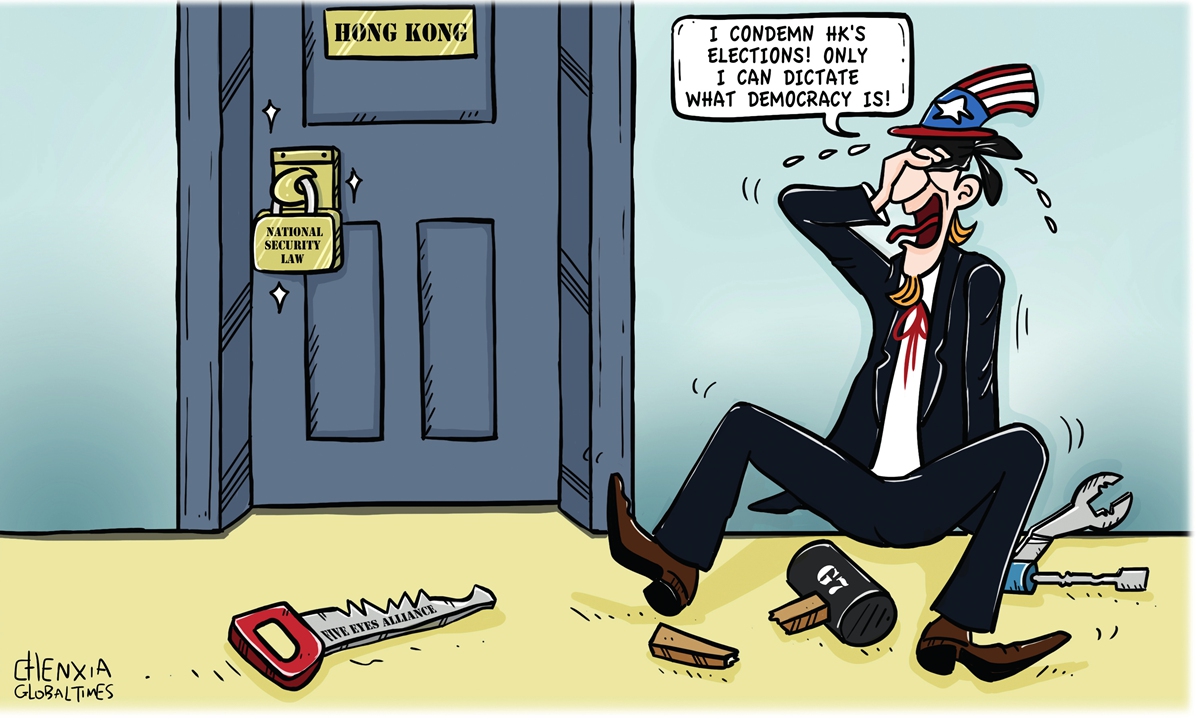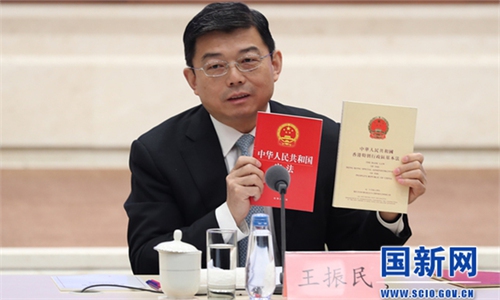
Illustration: Chen Xia/GT
In the mid-1970s I lived in a building with five other people, each renting our own room. One of the other tenants was a young man from Hong Kong who was studying in my home town, where there is a maritime college which attracts students from around the world.
I knew little about Hong Kong's culture or history, so I remember very clearly the day my friend told me that even though he had lived there for all of his life he had no say in how the territory was governed, and had no right to vote in elections or to have his views represented to those in authority ruling over him. Of course, at that time those who ruled over him were the British, in the form of an unelected governor. The governors of Hong Kong were appointed by the English monarch - most recently Queen Elizabeth II, who herself became the United Kingdom's unelected head of state simply by inheriting the role from her father - acting on advice from the British government almost 6,000 miles (about 9,600 km) from Hong Kong in London.
I was reminded of this recently as there has been widespread coverage - and often criticism - of Hong Kong's recent legislative elections. Most media outlets in Britain have reported on the election negatively, claiming that because some candidates critical of Beijing were not allowed to contest, the elections were therefore valueless as exercises in democracy. This media coverage was further heightened when the governments of several nations in the Anglosphere issued a joint statement claiming that the elections were a sham.
These nations were my own United Kingdom, along with the US, Canada, Australia and New Zealand. Their statement was widely reported.
The statement claimed democratic freedoms were being eroded in Hong Kong, pointing to the exclusion from standing of several candidates. Chinese officials were reported as explaining that the changes were "improvements" intended to provide for only "patriots" to be in control of Hong Kong. However, the reports did not set the situation in Hong Kong in its correct historical context. There was no explanation, for example, that the British government - shouting loudly that the electoral changes were an abuse of human rights - ruled over the territory for well over a century without offering any Chinese person living there, including my friend the marine student, the opportunity to take part in anything resembling an election.
Real moves to introduce any form of democracy to Hong Kong did not come until China and Britain negotiated the Sino-British Joint Declaration, which was signed in 1984. The declaration did not come into force until 1997, once the British had left their former colony. It is also worth remembering that Britain's colonization of Hong Kong and neighboring territories was forced upon the Chinese nation after the armed forces and gunboats of the British Empire fought two wars to enable British merchants to sell opium (then illegal in China). None of this history is usually mentioned in media reports in the West.
It is also ironic that Britain claims the electoral changes and measures introduced to deal with the media in Hong Kong are attacks on freedom and human rights because right now there is a great controversy in the UK over the government's plans to bring in new laws which could make peaceful protest illegal. The new laws will also criminalize those who save the lives of drowning people at sea if those people are refugees, which could remove someone's nationality almost on a whim. This is hypocrisy on a grand scale from the British government, yet it still feels a moral superiority over and a right to judge China. People in Britain might find it difficult to reach this conclusion if they do not have access to all of the relevant facts. Perhaps if they had the facts they would have suspected that their government is not driven by a noble devotion to human rights but rather that it is motivated by Western nations' geopolitical and strategic self-interests.
What the British media also rarely reports when covering Chinese matters is that the Anglosphere group of nations mentioned earlier is also known as the Five Eyes and is essentially an espionage alliance formed to gather intelligence from around the world. Initially, this was a defense organization set up following the Second World War, but now it has grown out of all proportion. Its intelligence gathering capability is now used to spy on the citizens of the five nations: this is an illegal act if done by a home intelligence service against its own citizens. These nations spy on each other's citizens and exchange the information. This is not the fantasy of espionage fiction but hard facts exposed in 2013 by Edward Snowden, a former computer analyst with America's powerful National Security Agency (NSA) and the notorious Central Intelligence Agency (CIA). His leaks also exposed how governments in these countries were working with capitalists running global telecommunication companies.
The Five Eyes statement urged China to abide by its "international obligations" but of course Britain and the other four countries have no legal jurisdiction over Hong Kong. The UK, in particular, no longer has any sovereignty over Hong Kong, even if it behaves in a way which suggests it would still like to have. The people living in Hong Kong are Chinese, not British. Ironically, the UK government has suggested that Hong Kong citizens be offered British citizenship at a time when it is forcing through laws which will make it harder than ever for people from abroad to reach British shores.
As a spokesperson for the Chinese government said, "No foreign country or organization has the right to take the Joint Declaration as an excuse to interfere in Hong Kong affairs, which are China's internal affairs." Yet Britain still behaves like a colonial power in the area.
It would be extraordinary if these nations did not interfere in China's affairs. It has happened for centuries, even as far back as what the British call the Opium War, or Anglo-Chinese War, when a technologically and militarily superior nation imposed its will on China by force. Nobody from the rest of the Five Eyes - not the US, nor Canada, New Zealand or Australia - complained about the lack of an electoral system in Hong Kong when the British were in charge less than three decades ago. But now as China attempts to control the destiny of its own territory and people, the democratic differences in systems of the West and the East are used to attack China.
These are the things which people in Britain have not been told. It is a matter of historical record, they can be able to search out the information as I have. But few have the time or inclination to closely examine the news. In our busy lives most people place their trust in the news they consume… and very often that trust is betrayed.
Of course, it may well be that when armed with all of the facts people in Britain might still regard what happened in Hong Kong over the legislative elections as wrong. They may disagree with the behavior of the Chinese government. That is their right - but to exercise that right they must be fully informed if their opinion is to be an honest one.
The author worked as a journalist in Britain for more than 45 years. He is a member of both the National Union of Journalists and the University and College Union in Britain. opinion@globaltimes.com.cn

